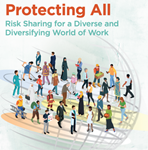| |
|
| |
|
| |
The World Bank’s new White Paper falls short on its objective of ‘protecting all’ |
| |
|
| |
 |
The World Bank recently issued a White Paper on rethinking social protection systems to extend coverage. While at first glance this is an honourable goal, the proposals in Protecting All: Risk-Sharing for a Diverse and Diversifying World of Work would do little to achieve this aim. The paper proposes a rollback of existing rights and protections for workers, both in terms of social security and labour market protections. Leo Baunach, Evelyn Astor and Stephen Kidd argue that this approach would increase inequality and undermine poverty reduction.
The World Bank is the largest multilateral institution devoted to promoting development. Unfortunately, its promotion of the Washington Consensus, pension privatisation, poverty targeting and other failed policies have caused immense damage to developing countries. No matter, the authors say: “Rather than an indication of poor development progress,” the lack of social protection coverage in developing countries means that it will be easier to implement the untested and inequitable framework presented in the White Paper (pg. 31). Read more
|
| |
|
| |
|
| |
Declaration of Civil Society Organisations at the World Bank and IMF Annual Meetings |
| |
|
| |
In a joint declaration, Civil Society Organisations reject the IMF austerity policies implemented in Ecuador, Argentina and Haiti, with agreements that include the restriction of public investment, reduction of labor rights, establish tax amnesties for the corporate sector and trigger a continued deterioration in public services. This is not the way to either prevent or resolve a crisis. The IMF has to change its austerity and deregulatory structural reform policies. Countries must have access to financing with sovereignty over their economic policies and in a a way that the State can guarantee human rights, civil and political, as well as economic and social rights, in line with their Constitutions and international treaties, and with the participation of diverse sectors of society, including social movements of indigenous people, women and workers. Read more
|
| |
|
| |
|
| |
People’s Assembly Debates UN Reform and HLPF Review |
| |
|
| |
On 24-25 September, parallel to these High-level UN meetings and closed-door or invitation only business meetings, civil society organisations engaged in critical discussions on the future of sustainable development and reforms needed to ensure a just and equitable future for all.
The People’s Assembly hosted a session on “High level political forum (HLPF) Reform Including the Role of Private Sector in the UN”. The conversation, moderated by Jens Martens of Global Policy Forum (GPF), featured panelists Oli Henman of Action 4 Sustainable Development (A4SD), John Romano of the Transparency, Accountability, Participation (TAP) Network, Kate Donald of the Center for Economic and Social Rights (CESR) and Barbara Adams of the GPF. Their remarks and the subsequent interactive conversation touched on challenges and opportunities ahead regarding reform to the wider UN, proposals to reconstitute the HLPF, and immediate opportunities to reform the HLPF. Read more
|
| |
|
| |
|
| |
Growing Inequality in South Asia |
| |
|
| |
The South Asia Inequality Report 2019 aims to flag up the seriousness of growing inequality in South Asia as a result of government policies and programmes that benefit only a handful of rich leaving behind a large section of society who are denied access to the basic human rights and needs.
The report published by SAAPE discusses the common problems caused by inequality and its impact on the lives of the people across South Asian countries.
The high level of economic growth in South Asia has not resulted in welfare improvement especially in case of the poor since they have failed to gain any benefits in comparison to the rich. Societal welfare has been remarkably decreased because the economic growth has benefited the rich at the cost of the poor. Read more
|
| |
|
| |
|
| |
AGS 2020: Move from Aspiration to Inspiration on Social Rights and Poverty Reduction |
| |
|
| |
European Anti Poverty Network (EAPN) has written to the President of the European Commission to ensure the AGS 2020 continues its progress towards a more balanced social/economic/environmental strategy delivering on poverty, social rights + participation.
EAPN underlines 10 key messages for the 2020 Annual Growth Survey, building on their exchanges with their members on their findings this year and particularly on the EAPN Assessment of the Semester 2019: Is the 2019 European Semester more social? Read more
|
| |
|
| |
|
|
Welcome to new members |
| |
|
|
|
|
|
|
|
|
|
| |
By harnessing transformative interfaith action in communities, Norwegian Church Aid – Tanzania (NCA Tanzania) engages community members and local partners to uphold peace and promote social cohesion. Our interfaith community projects on budget monitoring, and savings and loan groups have proved vital for harmonious networking and interaction.
Contact information: Sarah Shija, Senior Program Officer
| |
| |
|
| |
|
|
|
| |
Please see his publications here.
| |
| |
|
| |
|
